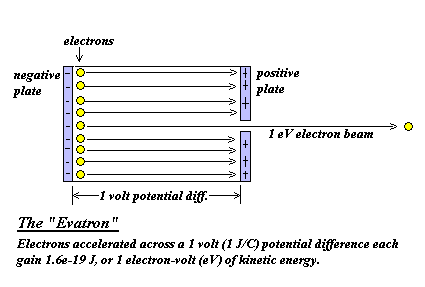 |
Units in Particle Physics or: "What GeVs?" |
 |
Conservation Laws - Data Analysis Using Graphs - Histograms - Units or Vectors in Particle Physics
Read a little about particle physics, and soon you'll see some units that aren't quite MKS . . . or cgs either. These odd units are all based on the electron-volt (eV) which itself comes from the simple insight that a single electron accelerated by a potential difference of 1 volt will have a discreet amount of energy, 1 eV = (1.609 x 10-19 C)(1 J/C) = 1.609 x 10-19 J. Take a look:To make matters more complicated, we can make multiples of 1 eV:
It gets better, though. Energy units have dimensions of (mass)(length)2/(time)2. Divide that by the dimensions of velocity, (length)/(time). What do you get?
1 keV = 103 eV 1 MeV = 106 eV 1 GeV = 109 eV and 1 TeV = 1012 eV
(hence the Tevatron)
That's right, (mass)(length)/(time) which are the dimensions of momentum. Physicists take advantage of this to divide energy in, say MeV, by a fundamental constant that has units of velocity, namely the speed of light c to get useful units of momentum: MeV/c. Anytime we divide energy units by c we get momentum: eV/c, keV/c, MeV/c, GeV/c and even TeV/c. To convert these to MKS, use the table below.
What happens if we divide by c again? Then we divide (length)/(time) out of our momentum dimensions, leaving only (mass). That's right, physicists make mass units out of eV/c2, keV/c2, MeV/c2, GeV/c2 and, yes, TeV/c2.
Hmmm, mass units equal energy units divided by c2, or m = E/c2. Isn't that E = mc2?
Of course, you know that in any language endings get dropped. Going to becomes gonna, buenos dias becomes buen' dia, and ankopan desu is rendered anpan des'. Well, physicists do the same thing, so they will often refer to the energy of a particle in MeV, its momentum in MeV, and its mass in MeV. They should say MeV, MeV/c, and MeV/c2, respectively, but they are only human.
So when someone tells you the mass of the electron is 0.511 MeV, don't panic. Just place a mental over c2 in the statement and all will be well.
Table of Conversions to MKS
ENERGY MOMENTUM MASS 1 eV = 1.609 x 10-19 J 1 eV/c = 5.36 x 10-28 kg-m/s 1 eV/c2 = 1.79 x 10-36 kg 1 keV = 1.609 x 10-16 J 1 keV/c = 5.36 x 10-25 kg-m/s 1 keV/c2 = 1.79 x 10-33 kg 1 MeV = 1.609 x 10-13 J 1 MeV/c = 5.36 x 10-22 kg-m/s 1 MeV/c2 = 1.79 x 10-30 kg 1 GeV = 1.609 x 10-10 J 1 GeV/c = 5.36 x 10-19 kg-m/s 1 GeV/c2 = 1.79 x 10-27 kg 1 TeV = 1.609 x 10-7 J 1 TeV/c = 5.36 x 10-16 kg-m/s 1 TeV/c2 = 1.79 x 10-24 kg
TRY SOME PRACTICE PROBLEMS
